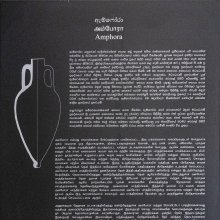Tarai, Taṟai, Tārai, Ṭarāi, Tarāi: 5 definitions
Introduction:
Tarai means something in the history of ancient India, Hindi, biology, Tamil. If you want to know the exact meaning, history, etymology or English translation of this term then check out the descriptions on this page. Add your comment or reference to a book if you want to contribute to this summary article.
Images (photo gallery)
India history and geography
Source: archive.org: Nilamata Purana: a cultural and literary study (history)Tarai or Siwalik refers to a minor mountain range termed Upagiri in the Mahābhārata and the Aṣṭādhyāyī.—Two parallel and ascending lines of the Himalayan ranges known as the Lesser Himalaya and the Great Central Himalaya are referred to in the Nīlamata under the terms “Bahirgiri” and “Antargiri”. The Pāli literature designates them as Chulla Himavanta and Maha Himavanta. The Mahābhārata and the Aṣṭādhyāyī know one more division Upagiri which signifies the Tarai or Siwalik range.

The history of India traces the identification of countries, villages, towns and other regions of India, as well as mythology, zoology, royal dynasties, rulers, tribes, local festivities and traditions and regional languages. Ancient India enjoyed religious freedom and encourages the path of Dharma, a concept common to Buddhism, Hinduism, and Jainism.
Biology (plants and animals)
Source: Wisdom Library: Local Names of Plants and DrugsTarai in the Hindi language is the name of a plant identified with Melocanna baccifera (Roxb.) Kurz from the Poaceae (Grass) family having the following synonyms: Bambusa baccifera, Melocanna baccifera, Melocanna bambusoides. For the possible medicinal usage of tarai, you can check this page for potential sources and references, although be aware that any some or none of the side-effects may not be mentioned here, wether they be harmful or beneficial to health.
Source: Google Books: CRC World Dictionary (Regional names)Tarai in India is the name of a plant defined with Melocanna baccifera in various botanical sources. This page contains potential references in Ayurveda, modern medicine, and other folk traditions or local practices It has the synonym Beesha rheedei Kunth (among others).
Example references for further research on medicinal uses or toxicity (see latin names for full list):
· Plants of the Coast of Coromandel (1819)
· Neue Entdeckungen im ganzen Umfang der Pflanzenkunde (1821)
· Hortus Bengalensis, or ‘a Catalogue of the Plants Growing in the Hounourable East India Company's Botanical Garden at Calcutta’ (1814)
· Annals of the Royal Botanic Garden, Calcutta (1896)
· Preliminary Report on the Forest and other Vegetation of Pegu (1875)
· Hortus Indicus Malabaricus.
If you are looking for specific details regarding Tarai, for example pregnancy safety, health benefits, chemical composition, side effects, diet and recipes, extract dosage, have a look at these references.

This sections includes definitions from the five kingdoms of living things: Animals, Plants, Fungi, Protists and Monera. It will include both the official binomial nomenclature (scientific names usually in Latin) as well as regional spellings and variants.
Languages of India and abroad
Hindi dictionary
Source: DDSA: A practical Hindi-English dictionaryTarāī (तराई):—(nf) foothill; curing (of concrete etc.); constant wetting/drenching.
...
Tamil dictionary
Source: DDSA: University of Madras: Tamil LexiconTarai (தரை) [taraital] 4 transitive verb cf. தறை-. [tharai-.] To rivet with a hammer; சம்மட்டியால் அடித்தல். [sammattiyal adithal.] (J.)
--- OR ---
Tarai (தரை) noun < தரை¹-. [tharai¹-.] Head of a nail, of a rivet; ஆணித்தலை. [anithalai.] (W.)
--- OR ---
Tarai (தரை) noun < dharā.
1. The earth; பூமி. தரையொடு திரிதல நலிதரு . . . சலதரன் [pumi. tharaiyodu thirithala nalitharu . . . salatharan] (தேவாரம் [thevaram] 568, 2).
2. Soil, land, ground; நிலம். தரையில் விழுந்து பணிந்தனர் [nilam. tharaiyil vizhunthu paninthanar] (கோயிற் புராணம் பதஞ்ச. [koyir puranam pathancha.] 43).
--- OR ---
Taṟai (தறை) [taṟaital] 4 transitive verb
1. To beat down flat; to hammer, as the head of a nail or the end of a bolt after fixing on the nut; to rivet; அணியை அடித்து இறுக்குதல். [aniyai adithu irukkuthal.] (J.)
2. To fasten two beams or rafters together by hammering in spikes; ஆணியால் தைத்தல். [aniyal thaithal.] Local usage
3. To make an accusation, commonly false; குற்றப்படுத்துதல். [kurrappaduthuthal.] (J.) — intransitive To become flat; to be flattened; தட்டையாதல். தீரத் தறைந்த தலையும் [thattaiyathal. thirath tharaintha thalaiyum] (கலித்தொகை [kalithogai] 65).
--- OR ---
Taṟai (தறை) noun perhaps from தறு-. [tharu-.] cf. dharā. Land, ground. See தரை³. [tharai³.] பிள்ளைகள் தறையிற் கீறிடில் [pillaigal tharaiyir kiridil] (கம்பராமாயணம் சிறப். [kambaramayanam sirap.] 10).
--- OR ---
Tārai (தாரை) noun < tārā.
1. Apple of the eye; கண்மணிமேகலை (பிங்கலகண்டு) இருதாரை நெடுந்தடங்கண் [kanmani. (pingalagandu) irutharai nedunthadangan] (மகாபாரதம் அருச்சுனன்றவ. [magaparatham aruchunanrava.] 38).
2. Eye; கண். (திவா.) தாரை நெருப்புக [kan. (thiva.) tharai neruppuga] (கம்பராமாயணம் சடாயுவுயிர். [kambaramayanam sadayuvuyir.] 103).
3. Tārā, wife of Jupiter, one of pañca-kaṉṉiyar, q. v.; பஞ்சகன்னியருள் ஒருத்தியான வியாழன் மனைவி. இளநிலாநகைத் தாரையை விடுக்கிலன் [panchaganniyarul oruthiyana viyazhan manaivi. ilanilanagaith tharaiyai vidukkilan] (காசிகண்டம் [kasigandam] 15, 17).
4. Tārā, wife of Vāli; வாலியின் மனைவி. தாரை யென் றமிழ்திற் றோன்றிய வேயிடைத் தோளினான் [valiyin manaivi. tharai yen ramizhthir ronriya veyidaith tholinan] (கம்பராமாயணம் வாலிவதை. [kambaramayanam valivathai.] 13).
5. Star; நட்சத்திரம். (பிங்கலகண்டு) [nadsathiram. (pingalagandu)]
--- OR ---
Tārai (தாரை) noun < dhārā.
1. Row, range, line, series; வரிசை. [varisai.]
2. Stripe, streak; கோடு. [kodu.]
3. Order, arrangement, regularity; ஒழுங்கு. நெறித்தாரை செல்லாத நிருதர் [ozhungu. neritharai sellatha niruthar] (கம்பராமாயணம் சூர்ப். [kambaramayanam surp.] 137).
4. Way, path; வழி. (திவா.) வீரர்போகத் தாரை பெற் றிலர் [vazhi. (thiva.) virarpogath tharai per rilar] (உத்தரரா. வரையெ. [utharara. varaiye.] 17).
5. Foot track; அடிச்சுவடு. (பிங்கலகண்டு) [adichuvadu. (pingalagandu)]
6. Running in a straight line; நேரே ஓடுகை. (பிங்கலகண்டு) [nere odugai. (pingalagandu)]
7. Pace of a horse; குதிரைக்கதி. ஐந்துதாரையினுந் தூண்டி [kuthiraikkathi. ainthutharaiyinun thundi] (திருவாலவாயுடையார் திருவிளையாடற் [thiruvalavayudaiyar thiruvilaiyadar] 39, 35).
8. Downpour of rain; பெருமழை. (பிங்கலகண்டு) [perumazhai. (pingalagandu)]
9. Stream, as of water; நீரொழுக்கு. நெடுந்தாரை கண்பனிப்ப [nirozhukku. neduntharai kanpanippa] (திருவாசகம் [thiruvasagam] 7, 15).
10. Region adjoining anus of bulls and cows; மாட்டின் மலத் துவாரப் பக்கம். [mattin malath thuvarap pakkam.]
11. Speed; விரைவு. (திவா.) [viraivu. (thiva.)]
12. Tongue; நா. (சூடாமணிநிகண்டு) [na. (sudamaninigandu)]
13. Blade of a weapon; ஆயுதமடல். தாரைகொள் முக்கவைச் சுடர் வேல் [ayuthamadal. tharaigol mukkavais sudar vel] (கல்லாடம் [kalladam] 86, 34).
14. Sharpness; கூர்மை. (பிங்கலகண்டு) [kurmai. (pingalagandu)]
15. Discus weapon; சக்கராயுதம். [sakkarayutham.]
16. A quality of the diamond; வயிரக்குணங்களி லொன்று. [vayirakkunangali lonru.] (சிலப்பதிகாரம் அரும்பதவுரை [silappathigaram arumbathavurai] 14, 180, உரை. [urai.])
17. Threadbareness; ஆடையின் விலக்கிழை. [adaiyin vilakkizhai.] Local usage
--- OR ---
Tārai (தாரை) noun < tāra.
1. Long brass trumpet; நீண்ட ஊதுங்குழல். தாரை போரெனப் பொங்கின [ninda uthunguzhal. tharai porenap pongina] (கம்பராமாயணம் கடிமண. [kambaramayanam kadimana.] 41).
2. Long reed instrument; ஒருவகைச் சின்னம். [oruvagais sinnam.] (W.)
3. Water-squirt; நீர்வீசுங் கருவி. தாழ்புனற் றாரையும் [nirvisung karuvi. thazhpunar raraiyum] (பெருங்கதை உஞ்சைக். [perungathai unchaig.] 38, 105).
Tamil is an ancient language of India from the Dravidian family spoken by roughly 250 million people mainly in southern India and Sri Lanka.
See also (Relevant definitions)
Starts with (+3): Tarai-illakuruvi, Tarai-talvattil, Taraiccampanki, Taraiccenai, Taraigarti, Taraikkaran, Taraikkarru, Taraikkashayam, Taraili, Taraimalar, Taraimattam, Taraippacali, Taraippanku, Taraipparru, Taraippatuttu, Taraisu, Taraitara, Taraitattu, Taraivar, Taraivaram.
Ends with (+85): Acanomantarai, Aiaitarai, Akalatarai, Akkitarai, Akotarai, Amdhyaroko-jamghara-tarai, Amutatarai, Antarai, Antimantarai, Arukelunta-patutarai, Avantarai, Batarai, Bhartari, Bistarai, Cakaciratarai, Cakattiratarai, Callittarai, Cantarttarai, Catatarai, Cekappumantarai.
Full-text (+79): Amdhyaroko-jamghara-tarai, Taraiyani, Taraipparru, Taraimalar, Callittarai, Valantarai, Taraiyamai, Taraikkaran, Tarai-illakuruvi, Vellaittarai, Taraiccenai, Mattiya-taraikatal, Vayttarai, Vettantarai, Kattantarai, Centarai, Taraiyati, Karuntarai, Pancakanniyar, Pututtarai.
Relevant text
Search found 11 books and stories containing Tarai, Tarāī, Taṟai, Tārai, Tharai, Darai, Dharai, Thaarai, Ṭarāi, Tarāi, Taraai; (plurals include: Tarais, Tarāīs, Taṟais, Tārais, Tharais, Darais, Dharais, Thaarais, Ṭarāis, Tarāis, Taraais). You can also click to the full overview containing English textual excerpts. Below are direct links for the most relevant articles:
Garga Samhita (English) (by Danavir Goswami)
Verse 6.16.38 < [Chapter 16 - Seeing Śrī Rādhā’s Form]
The Religion and Philosophy of Tevaram (Thevaram) (by M. A. Dorai Rangaswamy)
Chapter 4.6 - (d) Symbology of the Yajnopavita as an ornament of Shiva < [Volume 2 - Nampi Arurar and Mythology]
Symbology of the sacred thread (Yajnopavita or Pancavata) < [Volume 2 - Nampi Arurar and Mythology]
Chapter 4.4 - Cosmogony in the Tevaram < [Volume 2 - Nampi Arurar and Mythology]
Jain Remains of Ancient Bengal (by Shubha Majumder)
Geographical settings of Zone IV < [Chapter 2 - Geographical Setting of the Study Area]
Geographical as well as Geo-political unit of Zone IV < [Chapter 2 - Geographical Setting of the Study Area]
General Introduction < [Chapter 2 - Geographical Setting of the Study Area]
Folk Tradition of Bengal (and Rabindranath Tagore) (by Joydeep Mukherjee)
Chapter 5.3 - Prosodic similarity between Lalon Fakir and Rabindranath Tagore
Chapter 4 - Musical elements of Baul tradition
Bhagavati-sutra (Viyaha-pannatti) (by K. C. Lalwani)

